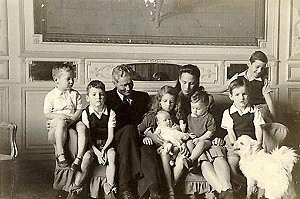By the time
they were living in Buenos Aires in 1943, Hiram and Rose
had seven children; their final brood was 11. While in
Argentina, Hiram became convinced that the Nazis were
funneling their gold into the country, and he begged the
State Department to allow him to investigate. He was
ignored and demoted again.
(4-45) Complicating the situation, all those who were still free
also fled as far south as they could. Marseilles, the largest port
city on the southern coast of France, became the focal point for
people seeking to escape the ever-tightening net. Its cafÈs
were a hodge-podge of Africans, refugees, Foreign Legionnaires,
Frenchmen, and dread-inspiring Nazis in their long coats and
golden swastikas.

(4-46) In this increasingly dangerous and desperate atmosphere - there were bombings and killings of anti-Nazi activists - it was Harry Bingham who just happened to be stationed in Marseilles as vice consul in charge of visas.
(4-47) It may be hard for us to understand, at some 60 years' distance, the importance of visas in Europe at that time. Multiply the Eli·n spark by hundreds of thousands of flares, add a life-and-death situation, and you might understand intensity with which people sought to escape the onslaught of the Nazis.
(4-48) One Austrian refugee wrote of this time, "Visas! We began to live visas day and night. When we were awake, we were obsessed by visas. We talked about them all the time. Exit visas. Transit visas. Entrance visas. Where could we go? During the day we tried to get the proper documents, approvals, stamps. At night in bed, we tossed about and dreamed about long lines, officials, visas, visas."
"In 1941, Harry was
relieved of his post in Marseilles. In the telegram
announcing his transfer to Lisbon was the emphatic
statement: 'This transfer was not made at his request nor
at his convenience'."
(4-49) This demand for visas placed the often backstage role of
vice consuls, in charge of passports and visas, directly into the
forefront of the action.
(4-50) Altogether, it now appears that in the whole of Europe, more than 300,000 visas were issued to people, mainly Jews, trying to flee Nazi-occupied countries. As far as is known, Harry may have been the only American diplomat to help in this area. In a statement from the present-day Secretary General of the United Nations, "diplomats are often seen as people without a moral compass." Harry, for whom the laws of God were stronger than the laws of men, was to prove otherwise. But he was to pay a price.
(4-51) Back in the United States, dignitaries such as Eleanor Roosevelt had become aware of the dilemma of the refugees in Southern France. Albert Einstein warned he that the State Department had erected a wall of bureaucratic measures between "the victims of Fascist cruelty and safety in the United States." She prodded the state department herself, writing, "Is there no way of getting our consul in Marseilles to help a few of these people out?"
(4-52 In terms of raising money and grabbing attention, it did not hurt that many of the trapped people were famous novelists, artists and scientists.
(4-53 Thomas Mann, the great German novelist, was already in the United States but his family was not, and he was one of the many clamoring for his family to get help. Afterward, he wrote Harry and thanked him for his part in rescuing his family. Mann's letter is one those stuffed into that sealed shut box.
(4-54) In New York, thanks to the efforts of such people as Dr. Reinhold Niebuhr, an eminent theologian, the Emergency Rescue Committee was formed. A young idealist named Varian Fry was dispatched by this committee to Marseilles, where he soon made contact with Harry.
(4-55) Though they had not met before, they would have recognized each other. Both had been to prestigious prep schools and Ivy League colleges, and both dressed impeccably in the uniform of the East Coast upper class. Both were aware of the horrors of the Nazis. In 1935, Fry had witnessed Nazis brutalizing Jews in Berlin, dragging them out of cars and beating them. In the late 1930s, while posted in Warsaw, Harry had warned his own mother against what he considered an unwise decision to play her violin for the Nazis in Poland.
(4-56) Even before Fry's arrival, since June of 1940 Harry had been issuing legal and illegal visas to refugees escaping France. Together, he and Fry planned and executed the escape of many more. Fry wrote: "He's the vice consul in charge of visas and the son of the late senator from Connecticut. He has a heart of gold. He does everything he can to help us, within the American law." In another not inapt statement, considering how Harry may have viewed himself; he added, "He (Harry) really is a prince, isn't he!"